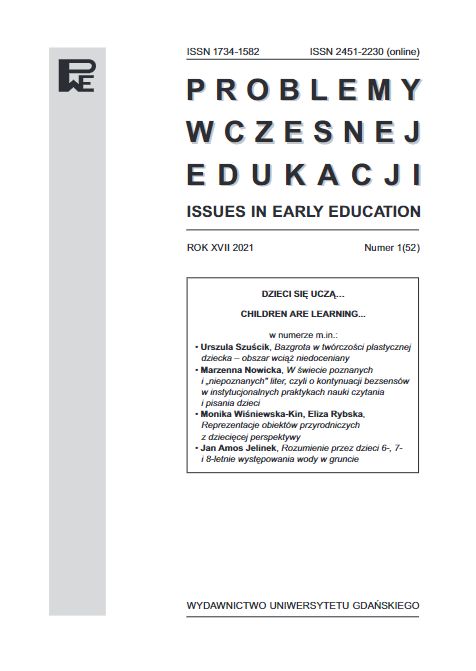Opening tasks, opening minds – a rediscovery of the open-ended approach
DOI:
https://doi.org/10.26881/pwe.2021.52.13Słowa kluczowe:
nauczanie oparte na dialogu, wczesnoszkolne nauczanie matematyki, rozwiązywanie zadań problemowych, podejście otwarte w nauczaniu matematyki, warunki w klasie sprzyjające nawiązywaniu dialoguAbstrakt
Open-ended tasks are designed such that they may have more than one correct solution or may be solved in more than one way. Although such tasks constitute an irreplaceable tool for prompting young learners to be actively and creatively involved in mathematical discourse, their implementation poses a challenge. Primary school students in Poland are usually offered algorithmic and rote teaching methods and are thus very often deprived of important elements of successful mathematics learning. The ubiquitous teacher-centred approach dedicates little time to any contribution from learners. The aim of this design research was to implement a change in early childhood mathematics education. The change comprised students creating and/or solving open-ended tasks in groups, thus promoting dialogic teaching. The results confirmed that students who are challenged with openended tasks through dialogic teaching not only genuinely engage in their activities, develop a better number sense and flexibility of thinking, but also help each other gain a deeper understanding of new concepts. Captured in this research were the synergistic images of the beauty of children’s reasoning and the beauty of mathematics as an open subject – an incentive for others to begin their journey with freedom of speech for young mathematicians.
Downloads
Bibliografia
Alexander R.J. (2018), Developing dialogic teaching: genesis, process, trial. “Research Papers in Education”, 33(5).
Alexander R.J. (2020), A Dialogic Teaching Companion. New York, Routledge.
Bakker A. (2018), Design Research in Education: A Practical Guide for Early Career Researchers. New York, Routledge.
Cobb P., Confrey J., diSessa A., Lehrer R., Schauble L. (2003), Design experiments in educational research. “Educational Researcher”, 32(1).
Dąbrowski M. (2013), (Za)trudne, bo trzeba myśleć? O efektach nauczania matematyki na I etapie kształcenia. Warszawa, IBE.
Gruszczyk-Kolczyńska E. (2009), Wspomaganie rozwoju umysłowego oraz edukacja matematyczna dzieci w ostatnim roku wychowania przedszkolnego i w pierwszym roku szkolnej edukacji. Warszawa, Wydawnictwo Edukacja Polska.
IBE (2013), Raport z badania. Szkoła samodzielnego myślenia. Warszawa, IBE.
IBE (2015), Wnioski z badań i dyskusji dotyczące nauczania matematyki. Warszawa, IBE.
Kalinowska A. (2010), Pozwólmy dzieciom działać. Warszawa, Centralna Komisja Egzaminacyjna.
Kantowski M.G. (1980), Some Thoughts on Teaching for Problems Solving. In: NCTM Yearbook 1980. Reston, National Council of Teachers of Mathematics.
Korczak J. (1926), Otwarte okno. „Szkoła Specjalna”, 3(1).
Pehkonen E. (ed.) (1997), Use of open-ended problems in mathematics classroom. Research Report 176. Helsinki, University of Helsinki, Department of Teacher Education.
Pehkonen E. (1999). Open-ended problems: A method for an educational change. In: M. Hejny, J. Novotna (eds.), Proceedings of International Symposium on Elementary Maths Teaching. Prague, Charles University, SEMT 99.
Philips D.C. (2006), Assessing the quality of design research proposals. In: J. Van den Akker, K.P.E. Gravemeijer, S. Mckenney, N. Nieveen (eds.), Educational design research. London, Routledge.
Reichenbach H. (1938), Experience and prediction. Chicago, University of Chicago Press.
Sandoval W. (2014), Conjecture Mapping: An Approach to Systematic Educational Design Research. “Journal of the Learning Sciences”, 23(1).
Sawada T. (1997), Developing Lesson Plans. In: J. Becker, S. Shimada (eds.), The Open-Ended Approach: A New Proposal for Teaching Mathematics. Reston, National Council of Teachers of Mathematics.
Semadeni Z. (2015), Matematyka w edukacji początkowej – podejście konstruktywistyczne. In: Z. Semadeni, E. Gruszczyk-Kolczyńska, G. Treliński, B. Bugajska-Jaszczołt, M. Czajkowska, Matematyczna edukacja wczesnoszkolna. Teoria i praktyka. Kielce, Wydawnictwo Pedagogiczne ZNP.
Singapore Ministry of Education’s Curriculum Planning and Development Division (2020), Primary School Subjects and Syllabuses. 2021 Mathematics Syllabus, Primary One to Six. Singapore, Ministry of Education.
Szemińska A. (1981), Rozwój pojęć matematycznych u dziecka. In: Z. Semadeni, Nauczanie początkowe matematyki. T. 1. Warszawa, Wydawnictwo Szkolne i Pedagogiczne.

 Uniwersyteckie Czasopisma Naukowe
Uniwersyteckie Czasopisma Naukowe





